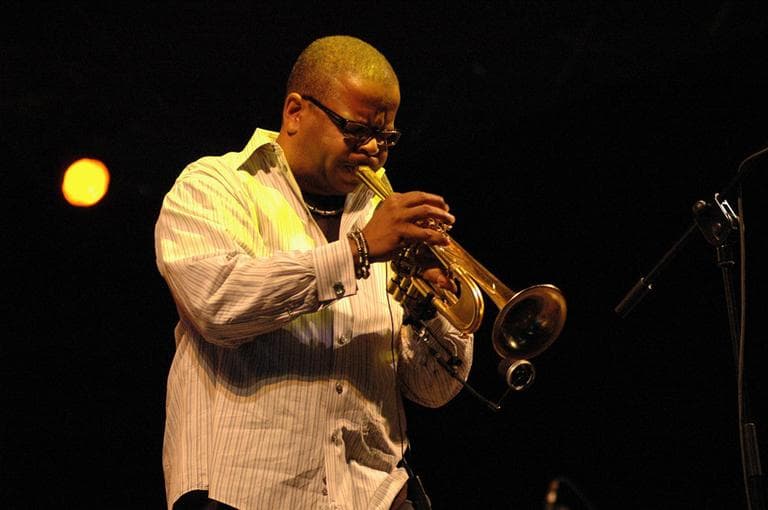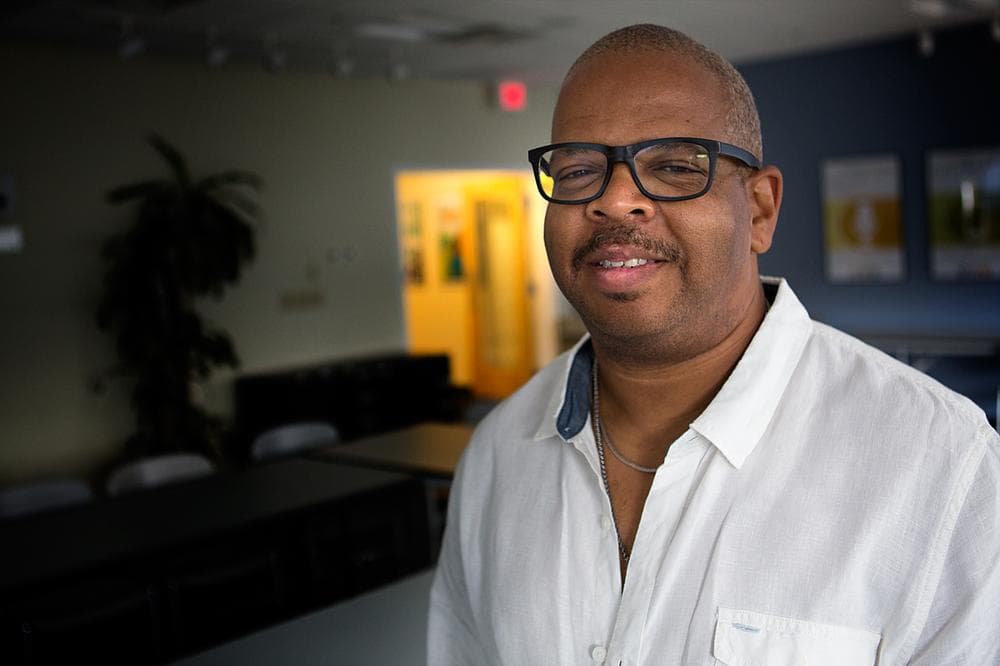Advertisement
Jazz And Its Future
ResumeWith Newport’s Jazz Festival opening this weekend, we talk jazz in America — where it is and where it’s going — with jazz great Terence Blanchard, Jonathan Batiste and NPR's Patrick Jarenwattananon.

The Newport Jazz Festival opens this weekend, and there will be great old names and talents in the spotlight — Chick Corea, Herbie Hancock, the great octogenarian Wayne Shorter and his quartet.
But there will be younger talent aplenty, too. And new sounds of jazz — Robert Glasper, Esperanza Spalding, Amir ElSaffar, Jonathan Batiste.
And a bridge like Terence Blanchard.
This hour, On Point: Batiste and Blanchard are with us. We’re looking at jazz and where it’s headed.
-- Tom Ashbrook
Guests
Terence Blanchard, five-time Grammy Award-winning jazz trumpeter, bandleader, composer, arranger and film score composer. (@T_Blanchard)
Jonathan Batiste, jazz singer, multi-instrumentalist and bandleader. He performs with the trio, Stay Human. (@JonBatiste)
Patrick Jarenwattananon, jazz critic, producer for NPR Music, editor of NPR's A Blog Supreme. (@blogsupreme)
Interview Highlights

Terence Blanchard on creating his music:
What's happening here is kind of like a melding of a lot of musical genres together, trying to take composition and the world of jazz to a new place or a different place, trying to bring in my background as a film composer, my background as a person who loves classical music into the world of jazz but not forgetting the tradition of jazz.
Blanchard on young audiences and the evolution of jazz:
There are younger people who are in the audience ... When people have that argument [that the audience is "graying"], I think a lot of that is because certain musicians are trying to uphold a tradition. We have to constantly move forward.
This music is an evolutionary thing. It has to evolve daily, and it has to be relevant. If you those elements in your music, you're going to attract younger people. You're going to attract people who are into things that are happening now. It's not to say that we don't respect our traditions and our history — we do, and you can hear that in the music — but the other side of it is you have to move forward.
We have to take all of who we are and bring all of those things together to create an art form that's unique and really our own sound.
Patrick Jarenwattananon on the new generation of jazz musicians:
One of the great things about this jazz community is that so many of the people who gained the respect of the jazz community come through the same sort of educational models. They come through more experienced band leaders, like Terence, and maybe they'll then choose to go off in a different direction themselves, but they still come from this place of learning and a lot of practice and tradition-absorbing.
I guess you could say that Robert Glasper is an example like that. his first few albums demonstrated this great, deep knowledge of how to play ding-ding-a-ling jazz but recently with his experiment band, which will be at Newport, he's been really reflecting the blend of hip hop and R&B and how modern jazz could sound.
One caller — John from Washington, D.C. — made the argument that jazz is something smart, educated people are "supposed" to like. Jarenwattananon responded:
It can be hard to convince fellow 20-somethings to come out and see a jazz show. I think there is a certain expectation among a certain group of folks that this is some thing that we're "supposed" to like. It's been branded as America's classical music. This great American product that we're supposed to appreciate in some intellectual way that is part of our cultural understanding. And of course I believe all that stuff, but I think there is a disconnect in trying to get from that stage to bring people actually out into the audience. Oftentimes when they actually come to the shows, a lot of people are entranced. But there is that gap between making jazz which is something that people talk over versus something that people will actively go to.
No, you don't have to like jazz, as Blanchard pointed out:
As a jazz artist, it's not like we're trying to beat everybody over the head and say, "You have to like jazz!" That's not the issue. The issue is do you find something in the music? In any art that happens — sometimes you can go to a museum and some things will hit you very different than other pieces, other works. I think jazz has a tendency in this country to be painted with one broad brush, and that's what we have to start to realize: that there are a lot of different facets and elements to this music.
Blanchard on the controversial nature of defining jazz:
Jazz has always been a controversial music because people always want to try to define exactly what it is — "It's this, it's that." At a certain point, Dizzy Gillespie was not considered jazz because those guys were playing too many notes.
So when you start talking about this music, it's been an evolutionary process ... you have all of these musicians who are doing all of these various things now. It's one of the reasons why people are confused when they come to hear my band because sometimes they think of us as a contemporary band and all of a sudden we start to play standards, and they think, "Well, wait a minute. What's going on?" The thing is we're just trying to have fun playing music and not trying to live by a certain set of definitions that really don't apply to who we are as creative artists.
Don't live in New York, Boston, Chicago, or Los Angeles? You might have issues seeing a live jazz performance, and that's a problem, said Jarenwattananon:
Outside of the major jazz cities, it's harder to see this music on a consistent basis. It's just become economically unviable for many jazz clubs to exist out of those large areas. I think you do see a lot of musicians now beginning to tour to do one-night hits at a major theater instead of doing a few nights at a club. Or play at the local university. Wherever there's enough money to make it viable for a jazz group to actually tour across the country. And that is an issue that we do need to figure out — how to more properly fund it so people can see it live because, let's face it, it is such live music. You're not getting the same thing if all you're doing is listening to jazz on a record.
Jonathan Batiste, 26, on learning from the older generation:
That's how you learn the music. You have to have somebody's that been there and done that. And you just soak the music up from them. And there's a lot that you learn. You look at it and you learn it vicariously. You don't even have to take a lesson playing or go through something that they're telling you. You just watch them and play with them and more time goes by and you learn more.
Playlist
Not available on Spotify but played during the hour:
"Personalities" by Fabian Almazan
"Let God Lead" by Jonathan Batiste
"Al-Badia" by Amir ElSaffar
From Tom's Reading List
NPR Music: 5 To Watch: Newport Jazz Festival Debuts: "In recent years, Newport Jazz has held surprises throughout its entire lineup, thanks to programming designed to bring more names into the fold."
Associated Press: 59th Newport Jazz Festival Stars Cole, Hancock: "The festival begins Friday with performances by Natalie Cole, her uncle Freddy Cole and the Bill Charlap Trio at the International Tennis Hall of Fame."
The Atlantic: The End Of Jazz: "There is no reason to believe that jazz can be a living, evolving art form decades after its major source—and the source that linked it to the main currents of popular culture and sentiment—has dried up."
The New York Times: Homophobia In The Ring Delivers Fatal Blows: "Toward the end of Terence Blanchard's 'Champion,' which received its premiere this week at the Opera Theater of Saint Louis here, the protagonist, Emile Griffith, relives the terror of being attacked by homophobic thugs."
Video
The Terence Blanchard Quintet plays from their 2009 album "Choices" live at WNYC's "The Greene Space" in New York City:
This program aired on August 2, 2013.